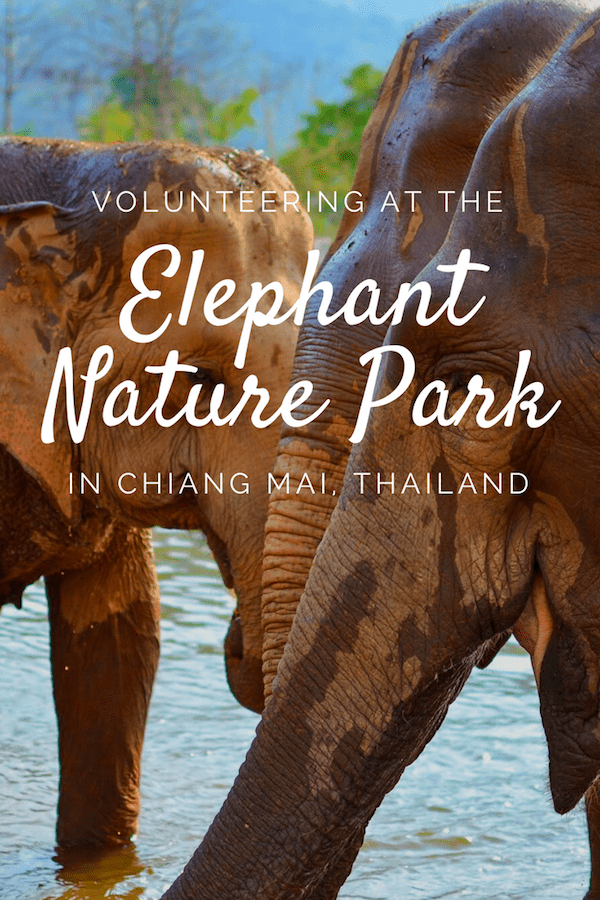To ride an elephant, or not to ride an elephant? As amazing as that photo op would be, the answer, in short, is no — you shouldn’t ride elephants. Sorry to burst your travel-fantasy-bubble, but it’s simply not ethical and the elephants don’t like it. And we all love elephants and want them to be happy, right? Thankfully, there are many options to get your elephant-loving fix. One of the best establishments out there is the Elephant Nature Park in Chiang Mai, Thailand. You can feed and bathe the elephants and get plenty of photos to make your Insta friends ooze with envy.
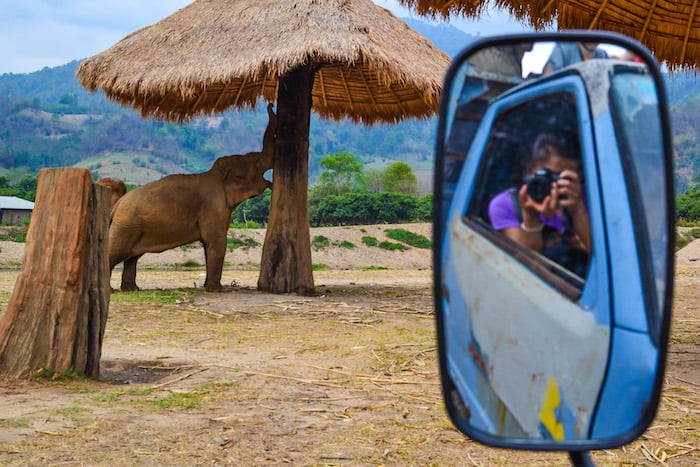
What is the Elephant Nature Park?
The Elephant Nature Park is a rehabilitation center 60 kilometers outside of Chiang Mai. Injured and abused elephants from Thailand and Burma are rescued and brought to this lush sanctuary and nursed back to health. This 250-acre-park has been open since the late 90s and is now home to over 70 elephants, 400 cats and more than 600 dogs.
Other than providing a home for hundreds of animals, the Elephant Nature Park also has a Rain Forest Restoration program where they are aiming to plant 25 acres of trees every year. They also employ locally to stimulate the economy, and strive to educate all visitors about the unethical elephant industry.
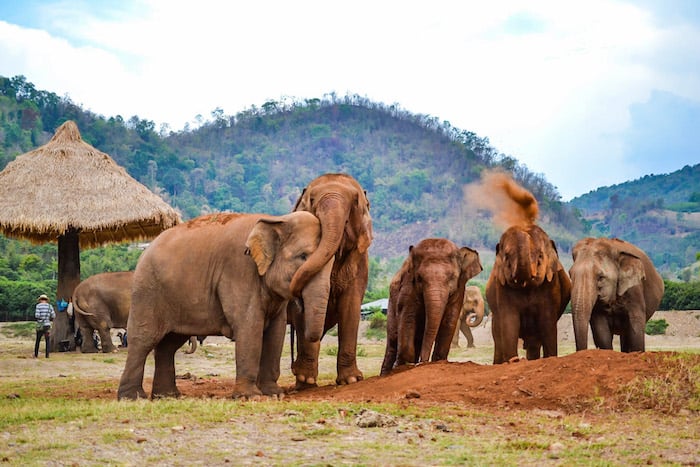
Volunteering at the Elephant Nature Park
Unlike most tourist camps, you’re able to observe these elephants in their natural habitat. Visitors can bathe the elephants, prepare their food, feed them, and work on other projects to help with their overall well-being. The longer trips allow you to get to know them more personally. You learn what their favorite snacks are and who their best friends are (yes, they actually have best friends and yes, it’s as adorable as it sounds). You’ll get to meet the owner, Lek (AKA The Elephant Whisperer), and witness how affectionate and loving elephants can be. Even though most are unrelated, having been rescued from the logging industry or suffered horrific injuries from human abuse or stepping on land mines, they have created family units here and protect each other.
If you’re looking to ride elephants or snuggle the babes, you won’t find that here. These are wild animals that have undergone unthinkable trauma while in captivity so they should be approached cautiously – kind of like meeting a hippogriff, to all my fellow Potterheads out there. And just like a hippogriff, if an elephant decides she likes you, you’ve made a friend for life!
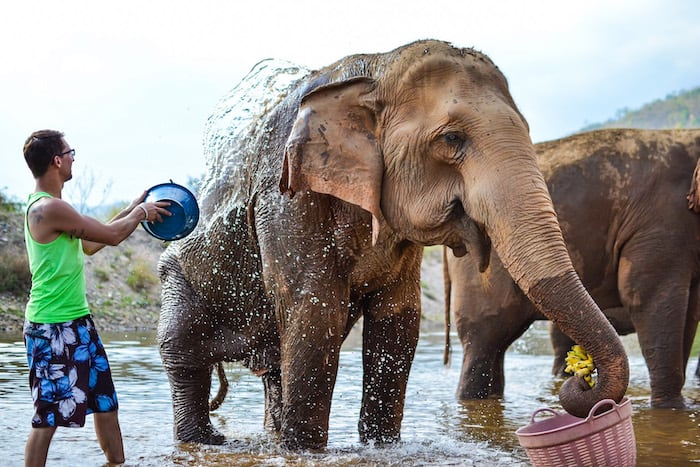
Types of Elephant Nature Park Visits
Depending on how much you love elephants (or really, how much time or money you have), there are various options for visitors. From half-day visits to two-week volunteer trips, every type of traveler can find time to gallivant with these beauties.
While the one day visits offer you a glimpse into how amazing elephants are, we recommend the longer trips where you can learn more about the history of how humans have treated them and how it affects them mentally and physically. The week-long trips also offer other activities like river rafting, authentic Thai massages, and language classes.
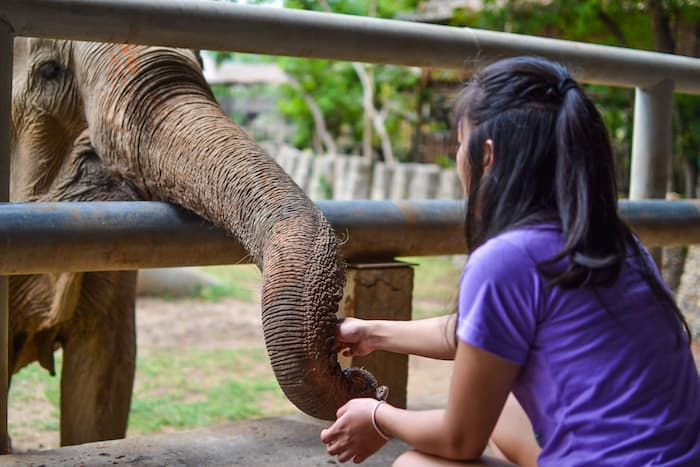
One Week at the Elephant Nature Park
Before embarking on a 5-month trip around Southeast Asia, the first thing I did was book a one-week volunteer trip at the Elephant Nature Park. This organization has got tourism down to a science and took care of every last detail. We were picked up in Chiang Mai and driven to the expansive park, teeming with life. Elephants roamed together, splashing mud on themselves. Dogs chased each other around, barking happily. Cats lounged lazily in the shade while birds flit around in every direction. Immediately, we were given a tour of the park and were introduced to dozens of elephants.
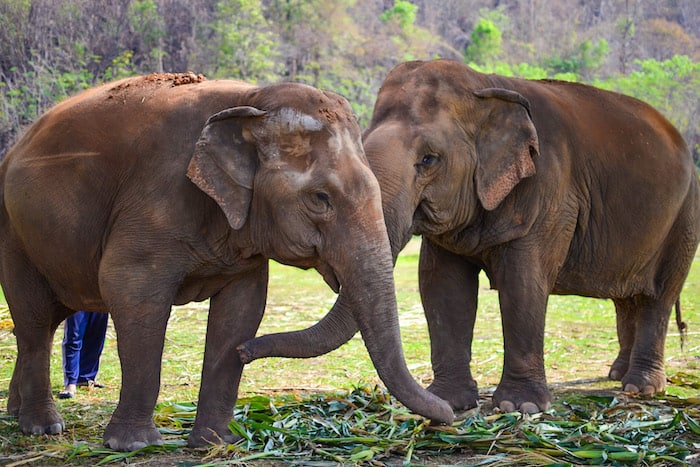
A Day in the Elephant Nature Park
Each day followed a similar schedule: we would wake up bright and early and feed ourselves (and more importantly, the elephants) brekkie. And by the way, the food here was unreal. Three shockingly delicious vegetarian buffets every day. I’ve never been so healthy, yet well-fed in my life. After breakfast, we would then meet up in groups to work on our assigned morning job, followed by lunch and then an afternoon job. These jobs varied each day and lasted about an hour or two. Some days we would unload trucks of elephant food, then wash and store them. Other days we would clean the elephant stalls, help rebuild fences, or scoop up elephant poop.
After “work”, we would have free time for the remainder of the day, with the option to bathe elephants in the late afternoon and attend a presentation after dinner to learn more about elephants. I would usually end my days with a $5 Thai massage, gazing at the stars while listening to the trumpeting and rumbling of the elephants as they bid each other goodnight.
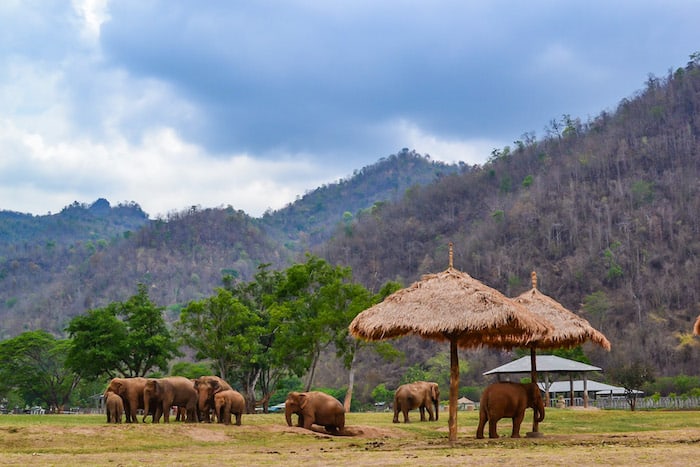
Why You Shouldn’t Ride Elephants
When the Thai government banned the use of elephants for logging, most of these gentle giants were sold to the tourism industry. Street begging, circus acts and elephant riding are amongst the tasks elephants have been forced to do. Because they’re highly intelligent creatures, elephants are easy to train and can be tortured into performing intricate tricks. Hooks, sharp tools made out of anything from plastic to ivory, are often used to train and drive elephants. Trainers, or “mahouts”, will inflict pain on the most sensitive areas of the elephant, like their trunks or behind their ears. Even if you go to a camp where you don’t see the mahouts using these tactics, they’ve found other discreet ways to control the elephants, like jabbing them with nails.
Other than using hooks, the easiest way elephants are trained is kidnapping them when they are young and more impressionable. Because of the incredibly strong bond between elephants, adult elephants are often killed trying to protect the calves from being taken from their herd. Once the young elephants are captured, they are “broken”. This is a physical and psychological process where they are put in cages and tortured into submission. Once they have lost the willingness to resist, they’re introduced to the tourism industry.
This horrendous treatment of elephants is mostly invisible to people or overshadowed by our desire for entertainment and Instagram Likes. As tourists, we vote by how we spend our money. Visiting these types of camps and riding elephants supports this cruel industry and enables them to continue running. Instead, choose an establishment like the Elephant Nature Park where you can be a part of ensuring these endangered animals don’t become extinct.
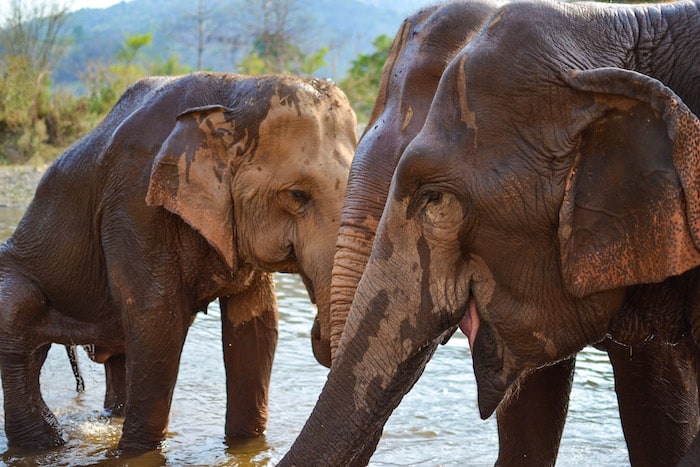
Want to learn more about how amazing elephants are?
Then watch this video!
More information on the Elephant Nature Park
Want to know more about these amazing animals or thinking of checking out the Elephant Nature Park yourself? Read these articles to help you plan your trip:
- Elephant Nature Park official website – book your trips here!
- Volunteering at the Elephant Nature Park, Chiang Mai from We Are Travel Girls
- Elephant Nature Park: Chiang Mai’s most responsible animal sanctuary by Kate Springer from CNN Travel
- Visiting the Elephant Nature Park in Chiang Mai – Responsible Tourism from Borders of Adventure
- Elephant Experience with Elephant Nature Park in Chiang Mai, Thailand from Backpackers Wanderlust
PIN NOW, READ LATER:
